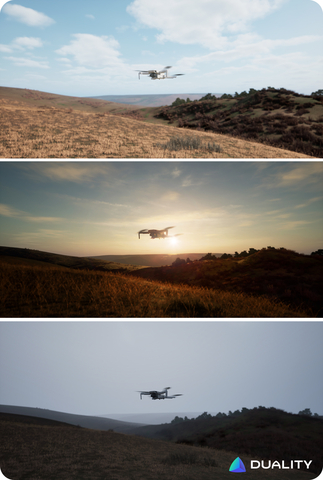Project is a part of the XM30 program plan to leverage cutting edge technology from the commercial sector for expedient deployment of vital tools for protecting U.S. troops
Duality AI, the company behind the Falcon digital twin simulation platform, announced today a contract award from the XM30 Program Office, the U.S. Army’s team building the next generation successor to the M2 Bradley infantry fighting vehicle. In response to the escalating threat of drone warfare, the XM30 Advanced Capabilities team is developing a robust counter-drone AI Target Detection and Recognition (AiTDR) system to reliably safeguard personnel and troops aboard the vehicle. To achieve this goal, the Army’s Project Linchpin team for AI and Machine Learning capabilities, in coordination with the Army Research Lab (ARL), will leverage synthetic data generated in simulation from virtual sensors in Falcon. Working with Duality in a digital-first approach will streamline the development and tuning of the critical AiTDR model well in advance of the physical system coming online.
This press release features multimedia. View the full release here: https://www.businesswire.com/news/home/20250410838504/en/

With Falcon, teams are able to generate vast varieties of high-quality synthetic training data that includes all types of operating conditions such as weather, lighting, and much more.
Employing digital twin simulation at the earliest stages of the AiTDR project will enable the XM30 team to preemptively address major development challenges, leading to shorter timelines and lower costs of field deployment. With Falcon, the team will generate vast varieties of high-quality training data, determine optimal sensor configurations, and test model performance in high-fidelity simulated scenarios. Awarding this contract to Duality AI continues the digital-first approach announced at the program’s outset, and builds on the successful strategy of opening the door for industry teams that are not traditional U.S. combat vehicle prime contractors.
“Accomplishing these critical early steps with digital twins is vital for a viable future of field-deployable AI systems,” said Michael Taylor, co-founder and Chief Product Officer of Duality AI. “Falcon’s complete control over simulation environments gives the Army ability to train and test the AiTDR model in complex conditions, explore varied drone detection scenarios, and validate potential solutions in simulation before the physical hardware is even ready for field testing.”
Entrusting mission-critical AI systems like the AiTDR with safeguarding soldiers’ lives demands consistent accuracy and reliability with little room for error. Delivering this level of performance requires high-quality training data in varieties and volumes that are simply not feasible to source in the physical world. Fortunately, Duality’s work across industry and government applications, including in the DARPA RACER challenge, is proving that digital twins are free of this limitation. Results from diverse customers are already showing that synthetic data from digital twin simulation is not only quicker and more cost-effective to generate but can also rival and improve the results obtained from real-world data.
With Falcon, the ARL team will be able to compose and simulate any scenarios they require — any drone, any environment, any visual conditions — and generate the needed data with any of Falcon’s virtual sensors. Using this data, the team will first deliver an AI model that functions while communicating with the Falcon simulator, and then continue to refine the performance of this first-generation algorithm by both improving the model and refining the simulation approach in collaboration with Duality’s AI engineering team. In the latter stages of the project, the team will assess broader applications of digital twin simulation in Falcon for addressing their expanding roster of AI/ML training data needs.
“We are thrilled to work with the Project Linchpin and ARL teams to push the possibilities of AI defense systems for the U.S. Army,” says Duality CEO and co-founder, Apurva Shah. “The XM30 digital-first approach to AI model deployment is farsighted and precisely the type of system development approach for which Falcon’s digital twin workflows have been designed. The XM30 program is transforming how tomorrow’s military technology is developed and we’re honored that Falcon is contributing to that future.”
To learn more about Duality AI and the full suite of Falcon products for digital twin simulation visit duality.ai, or sign up for FalconCloud today to directly experience the power of digital twin simulation from the web at falcon.duality.ai.
About Duality AI
Duality AI is a software company behind Falcon, the digital twin simulation platform. Organizations today are leveraging Falcon to help solve complex problems in AI and automation. By bringing high-fidelity digital twins of environments and robotic systems into Falcon, Duality’s customers generate accurate data and predictive behavior modeling that enables them to deploy automated systems robustly and at scale. Duality’s multidisciplinary team includes world-class engineers, simulation specialists, AI/ML experts and award-winning technical artists with over 70 patents across robotics, simulation, and visualization.
View source version on businesswire.com: https://www.businesswire.com/news/home/20250410838504/en/
“Accomplishing these critical early steps with digital twins is vital for a viable future of field-deployable AI systems,” said Michael Taylor, co-founder and Chief Product Officer of Duality AI.
Contacts
Mish Sukharev
E. press@duality.ai
P. 408-667-6432





